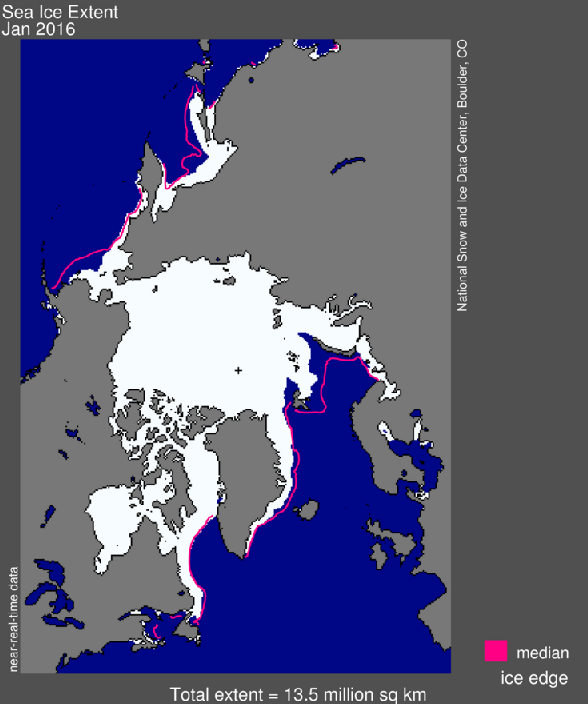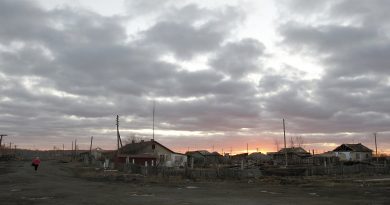Arctic sea ice hit record low for January

Sea ice extent over the Arctic last month was the lowest for any January in the satellite record, with freeze-up slowed by unusually high air temperatures over the Arctic Ocean and an atmospheric pattern in the Atlantic side that moved cold weather to more southern latitudes, scientists said.
The National Snow and Ice Data Center in Colorado reported that sea ice extent averaged 5.2 million square miles in January, about 7.1 percent below the 1981-2010 average and about 35,000 square miles lower than the previous record January low, which was set in 2011.
The low ice extent was tied directly to unusual weather in the far north.
“We had a January that was just absurdly warm over the Arctic Ocean,” said Mark Serreze, the center’s director.
Barents, Kara and East Greenland seas
That was partly the result of a negative turn in the Arctic Oscillation, a pattern that weakened the atmospheric barrier between the polar latitudes and the mid-latitudes, with possible contributions from the powerful El Nino system that is affecting the Pacific coast, Serreze said.
“There’s a lot of things conspiring at once right now,” Serreze said.
January ice extent was particularly low in the Barents Sea, Kara Sea and the East Greenland Sea on the Atlantic side of the Arctic, but also low in the Bering Sea and Sea of Okhotsk, the center reported.
The record-low January extent comes nearly a year after Arctic sea ice hit a record-low maximum. Sea ice usually grows from September, the period when the minimum is hit, through about the middle of March. But last year, the melt season started early — on Feb. 25 — and the maximum extent was the lowest since satellite measurements began in 1979.
Recent trends
Even with the record-low extent last month, and even during last year’s record-low maximum, marine areas in and around the Arctic were fairly well covered with ice. So how meaningful is a low winter extent?
“The winter extent is certainly not as important as end-of-summer extent,” Serreze said.
Still, there has been a recent trend toward reduced winter sea ice extent, he said. And winter measurements might give some clues to what will happen in the following summer.
Sea ice extent — defined by the NSIDC as areas where ice covers at least 15 percent of the water’s surface — does not necessarily reveal information about the health of sea ice. That ice may include a lot of thin ice that will disappear rapidly in the melt season, Serreze said.
“A lot of that may be really thin ice, which is going to melt out fairly quickly,” Serreze said.
Conditions could be setting up for another record-low maximum this year, he said, though a new period of fast late-winter ice growth is also possible.
Such late-season ice is not likely to last long.
“If you have that late-winter spurt, it’s going to be stuff that’s very thin and it’s going to be stuff that melts out pretty quickly,” he said.
Related stories from around the North:
Canada: Canadian river carries carbon from thawing permafrost to sea, Alaska Dispatch News
Finland: Climate change brings new insect arrivals to Finland, Yle News
Greenland: New model predicts flow of Greenland’s glaciers, Alaska Dispatch News
Norway: UN Secretary-General to visit Norwegian Arctic, Eye on the Arctic
Russia: Ancient virus found in Arctic permafrost, Alaska Dispatch News
Sweden: How will global warming affect the average Swede?, Radio Sweden
United States: Record permafrost erosion in Alaska bodes ill for Arctic infrastructure, Deutsche Welle’s Ice-Blogger



